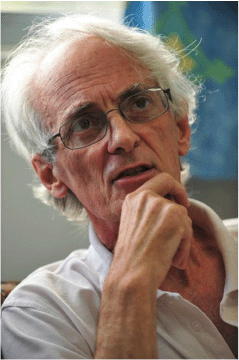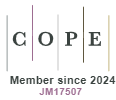Professor John Vince: a remarkable 5 decades of service to health in Papua New Guinea
Trevor Duke A B D * , Cornelia Kilalang C D , Nakapi Tefuarani A D and James Amini C D
A B D * , Cornelia Kilalang C D , Nakapi Tefuarani A D and James Amini C D
A
B
C
D
Professor John David Vince (Fig. 1), paediatrician, medical educator, scientist and humanitarian, departed Papua New Guinea (PNG) for retirement in the United Kingdom on 22 November 2024, after 48 years of service to PNG, and a month after the passing of his wife of over 40 years, Dr Bage Yominao. When Prof Vince left on an Air Niugini flight, he had a guard of honour of medical students, and his departure was covered in the national media.1
Prof Vince made an outstanding contribution to paediatrics and child health, and medical education in the Pacific and Asia. He spent nearly five decades in clinical, academic and public health service to the children of PNG. John Vince came to PNG from the UK in 1976, a young paediatrician, trained in Edinburgh, fresh from a Doctorate of Medicine in genetics, and he stayed for 48 years. He was Professor of Child Health at the School of Medicine in the University of PNG (UPNG) from 1990 until he stepped down from that position at the end of 2010 to take up a role as Director of Post-graduate Training and Research at UPNG.
Professor Vince dedicated his career to improving child health in one of the highest mortality countries in the Asia–Pacific region.2,3 He personally oversaw the training of more than 100 paediatricians from PNG and hundreds of local doctors. Every doctor in PNG for the last five decades benefited from John’s clinical wisdom and expert teaching, his deep understanding of the problems of child health in PNG and other developing countries, and his calm, thoughtful, practical approach.4 John has provided and taught the best possible clinical care in the most difficult of circumstances, always demonstrating the importance of dignity for families and children. This he did without favour; poor, destitute or illiterate mothers and their children received the same compassionate care and time as the wealthy businessman’s or politician’s children.
Prof Vince’s practice exemplified a struggle for equity, progress in child health and support for healthcare workers. His time saw major changes, including the emergence and better control of HIV, the resurgence of tuberculosis, improved cancer treatment, new vaccines being introduced, and reforms in nutrition and neonatal care.
Prof Vince was the chair of PNG’s Global Eradication of Polio Certification Committee, and advisor to the World Health Organization in the Western Pacific Region on many matters which affected children throughout Asia. He served on national, regional and international committees, he worked closely with community welfare groups, volunteer organisations, non-governmental organisations and United Nations agencies to improve child and maternal health.
Prof Vince had wide research interests, publishing papers on neonatal care,5–7 tuberculosis,8,9 HIV, social paediatrics, clinical care, childhood cancer,10–12 medical education13 and public health.3,14 He was one of the first to describe ‘swollen belly syndrome’ in infants in Kanabea in Gulf Province, and to identify its unique causative helminth: Strongyloides fuelleborni kellyi.15
Many of his publications were the result of supervising post-graduate students in projects. He always considered that the building of basic research and epidemiological skills among young doctors was paramount, and he never wavered from being generous with his time and in sharing his knowledge. Many times, he dispelled untrue theories and never wavered from basing his decisions and judgement on scientific evidence, including during the COVID pandemic.
Prof Vince had a leading hand in every edition of the PNG Standard Treatment Book; the world’s longest running evidence-based clinical paediatric guidelines in any developing country, now into its 11th edition after more than 30 years in continuous circulation.16,17 He co-authored the second edition of Paediatrics for Doctors in PNG,18 used widely as a reference throughout the country and in Asia. He edited and co-edited Child Health for Nurses and health extension officers (HEOs),19 an outstanding text written on child health for nurses.
From 2006 to 2023 Prof Vince was Deputy Dean and Associate Dean, Postgraduate studies, and from 2010 to 2023 he was Director of the Taurama Postgraduate Studies and Research Centre within the School of Medicine and Health Sciences, University of PNG. The strength he brought to these roles was based on decades of experience in PNG, wisdom and clarity of thought, and an insightful knowledge of people and culture.
In 2018, Prof Vince was honoured with an Outstanding Asian Paediatrician Award from the Asia Pacific Paediatric Association (APPA), received by Dr James Amini on his behalf at the APPA conference in Bali, Indonesia.
John often said that music and sport are what bring people together. He is a piano virtuoso, was the Port Moresby Choral Society Choir Master for many years, and has a love of rugby and reading. His view of the world is wide, and his concern for greater equality has influenced the thoughts of many others.
One reason John stayed in PNG for so long was his love for Dr Bage Yominao – the first female ophthalmologist trained in PNG – John’s enduring partner, supporter, and wife of over 40 years. Dr Yominao made an outstanding contribution to eye health in PNG, especially primary eye health. She learnt cataract surgery in Nepal and studied with Fred Hollows. Bage was an inspiring role model for women doctors, teaching many young ophthalmologists, and in her later years taught village women about economic and personal empowerment through her role in the organisation Personal Viability, a community-based university. John and Bage have two children who moved to the UK when they became adults, and they adopted four others, looked after them and helped them grow into good citizens in PNG. Bage sadly passed away on 25 October 2024.
Over five decades John and Bage helped thousands of health workers throughout their careers and lives, they treated tens of thousands of PNG patients, and their teaching has touched the lives of far more. The people of Papua New Guinea are healthier because of the dedicated careers and lives of Professor Vince and Dr Bage Yominao.
References
1 Tingkeo B. Renowned child health expert Professor John Vince bids farewell to PNG. Papua New Guinea Post-Courier, 22 November 2024. Available at https://www.postcourier.com.pg/renowned-child-health-expert-professor-john-vince-bids-farewell-to-png/
2 Vince JD. Millennium Development Goals: progress in Oceania. Arch Dis Child 2015; 100(Suppl 1): S63-5.
| Crossref | Google Scholar | PubMed |
3 Vince JD. Health services for all in 2050 – getting the balance right. P N G Med J 2013; 56: 1-4.
| Google Scholar | PubMed |
4 Vince JD. Forty years of postgraduate medical training at the University of Papua New Guinea. P N G Med J 2017; 60(1/2): 41-50.
| Google Scholar |
5 Vince JD. Neonatology: constraints, triumphs and challenges in contemporary Papua New Guinea. Med J Aust 1993; 159(2): 78-80.
| Crossref | Google Scholar | PubMed |
6 McMaster P, Vince JD. Outcome of neonatal care in Port Moresby, Papua New Guinea: a 19-year review. J Trop Pediatr 2000; 46(1): 57-61.
| Crossref | Google Scholar | PubMed |
7 Peters HR, Vince JD, Friesen H. Low birthweight at a Papua New Guinea highlands hospital. J Trop Pediatr 2001; 47(1): 17-23.
| Crossref | Google Scholar | PubMed |
8 Amini J, Poka H, Kumbu J, Pomat N, Ripa P, Tefuarani N, Vince JD, Duke T. The crisis of tuberculosis in Papua New Guinea – the role of older strategies for public health disease control. P N G Med J 2012; 55: 1-4.
| Google Scholar | PubMed |
9 McMaster P, Ezeilo N, Vince JD. A retrospective review of paediatric lymph node tuberculosis in Port Moresby, Papua New Guinea. Ann Trop Paediatr 2000; 20(3): 223-6.
| Crossref | Google Scholar | PubMed |
10 Anga G, Vince JD. Paediatric cancer in Papua New Guinea: Moving to the next stage. P N G Med J 2016; 59(1/2): 23-9.
| Google Scholar |
11 Lavu EK, Vince JD, Kiromat M, Oswyn G, Golpak P, Tefuarani N. Leukaemia in children in Papua New Guinea: an unusual pattern. Ann Trop Paediatr 2003; 23(4): 265-71.
| Crossref | Google Scholar | PubMed |
12 Kiromat M, Vince JD, Oswyn G, Tefuarani N. The management of children with cancer in Papua New Guinea: a review of children with cancer at Port Moresby General Hospital. P N G Med J 2004; 47(3/4): 138-45.
| Google Scholar | PubMed |
13 Kevau IH, Vince JD, McPherson JV. Tailoring medical education in Papua New Guinea to the needs of the country. Med J Aust 2004; 181(11): 608-10.
| Crossref | Google Scholar | PubMed |
14 Vince JD. Diarrhoea in children in Papua New Guinea. P N G Med J 1995; 38(4): 262-71.
| Google Scholar | PubMed |
15 Vince JD, Ashford RW, Gratten MJ, Bana-Koiri J. Strongyloides Species Infestation in Young Infants of Papua New Guinea: Association with Generalized oedema. 1979. P N G Med J 2005; 48(1/2): 50-7.
| Google Scholar | PubMed |
16 Vince JD, Mokela D. Thirty years of the Paediatric Standard Treatment Book. P N G Med J 2006; 49(3/4): 147-55.
| Google Scholar | PubMed |
17 Samiak L, Vince JD. The use of the Paediatric Standard Treatment Book by clinic and health centre staff. P N G Med J 2000; 43(1–2): 69-75.
| Google Scholar | PubMed |
18 Shann F, Biddulph J, Vince J. Paediatrics for Doctors in Papua New Guinea, 2nd edn. 2003. PNG Department of Health. Available at https://pngpaediatricsociety.org/wp-content/uploads/2013/05/Paediatrics-for-Doctors-in-Papua-New-Guinea.pdf
19 Biddulph J, Stace J, Danaya B, Vince J, Duke T. Child Health for Nurses and Health Extension Officers in Papua New Guinea, 3rd edn. 2022. Available at https://pngpaediatricsociety.org/wp-content/uploads/2022/07/Child-Health-for-Nurses-and-HEOs-in-Papua-New-Guinea-3th-Edition-March-2022.pdf



